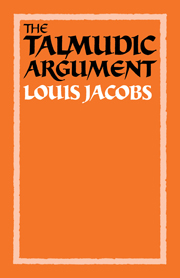Book contents
- Frontmatter
- Contents
- Preface
- Note on transliteration
- Note on Biblical translations
- Note on the Babylonian Talmud
- List of Abbreviations
- 1 The Talmudic argument
- 2 The literary form of the Babylonian Talmud
- 3 Berērah: retrospective specification
- 4 Yeúsh she-lo mi-da‘at: unconscious abandonment of property
- 5 Rubba: probability
- 6 Davar she-lo ba le-'olam: conveyance of a thing not yet in existence
- 7 Kol she-eyno be-zeh aḥar zeh afilu be-vat aḥat eyno: whatever cannot be established in a consecutive sequence cannot be established even in a simultaneous sequence
- 8 Yesh ḥoresh telem eḥad: a single act of ploughing can result in a number of penalties
- 9 Simanin de-oraita o de-rabbanan: whether reliance on distinguishing marks for the purpose of identification is Biblical or Rabbinic
- 10 Devarim she-be-lev eynam devarim: mental reservations in contracts are disregarded
- 11 Ḥazakah: presumptive state
- 12 Gadol kevod ha-beriot: the law and regard for human dignity
- 13 Hazmanah milta: whether the designation of an object for a particular use is effective
- 14 Mitzvat ‘aseh she-ha-zeman geramah: positive precepts dependent on time from which women are exempt
- 15 Heyzek she-eyno nikar: indiscernible damage to property
- 16 Kinyan ḥatzer: acquisition by means of a domain
- 17 Palginan be-dibbura: admission of part of a testimony even though another part of the same testimony is rejected
- 18 Tadir u-mekuddash: which takes precedence: the more constant or the more sacred?
- 19 Palga nizka: the nature of the payment of half-damages to which the owner of a goring ox is liable
- 20 Patur mi-diney adam ve-ḥayyav be-diney shamayim: cases where there is liability in the eyes of God even though the human courts cannot enforce payment
- 21 Maḥal ‘al kevodo kevodo maḥul: renunciation of honour by one to whom it is due
- 22 Conclusions
- Glossary
- Bibliography
14 - Mitzvat ‘aseh she-ha-zeman geramah: positive precepts dependent on time from which women are exempt
Published online by Cambridge University Press: 06 January 2010
- Frontmatter
- Contents
- Preface
- Note on transliteration
- Note on Biblical translations
- Note on the Babylonian Talmud
- List of Abbreviations
- 1 The Talmudic argument
- 2 The literary form of the Babylonian Talmud
- 3 Berērah: retrospective specification
- 4 Yeúsh she-lo mi-da‘at: unconscious abandonment of property
- 5 Rubba: probability
- 6 Davar she-lo ba le-'olam: conveyance of a thing not yet in existence
- 7 Kol she-eyno be-zeh aḥar zeh afilu be-vat aḥat eyno: whatever cannot be established in a consecutive sequence cannot be established even in a simultaneous sequence
- 8 Yesh ḥoresh telem eḥad: a single act of ploughing can result in a number of penalties
- 9 Simanin de-oraita o de-rabbanan: whether reliance on distinguishing marks for the purpose of identification is Biblical or Rabbinic
- 10 Devarim she-be-lev eynam devarim: mental reservations in contracts are disregarded
- 11 Ḥazakah: presumptive state
- 12 Gadol kevod ha-beriot: the law and regard for human dignity
- 13 Hazmanah milta: whether the designation of an object for a particular use is effective
- 14 Mitzvat ‘aseh she-ha-zeman geramah: positive precepts dependent on time from which women are exempt
- 15 Heyzek she-eyno nikar: indiscernible damage to property
- 16 Kinyan ḥatzer: acquisition by means of a domain
- 17 Palginan be-dibbura: admission of part of a testimony even though another part of the same testimony is rejected
- 18 Tadir u-mekuddash: which takes precedence: the more constant or the more sacred?
- 19 Palga nizka: the nature of the payment of half-damages to which the owner of a goring ox is liable
- 20 Patur mi-diney adam ve-ḥayyav be-diney shamayim: cases where there is liability in the eyes of God even though the human courts cannot enforce payment
- 21 Maḥal ‘al kevodo kevodo maḥul: renunciation of honour by one to whom it is due
- 22 Conclusions
- Glossary
- Bibliography
Summary
The sugya is Kiddushin 33b–35a. Mitzvat ‘aseh she-ha-zeman geramah is literally: ‘A positive precept that is caused by time’, i.e. that depends for its performance on a given time and is not a precept that can be carried out at any time. The sugya is appended to the Mishnah (Kiddushin 1:7): ‘And every positive precept dependent on time men are obliged to fulfil but women are exempt. And every positive precept not dependent on time both men and women are obliged to fulfil. And every negative precept, whether dependent on time or not dependent on time, both men and women are obliged to fulfil.’
The sugya opens with a Baraita: ‘Which are positive precepts dependent on time: sukkah (Leviticus 23: 42, only to be carried out on Tabernacles); lulav (‘palm branch, Leviticus 23: 40, only on Tabernacles); shofar (ram's horn’, Leviticus 23: 24; Numbers 29: 1, only on the New Year Festival); tzitzit (‘fringes’, Numbers 16: 38, only during the day, not at night); and tefillin (Deuteronomy 6: 8, only during the days and not the nights of the week and not on Sabbath and Festivals). And which are positive precepts not dependent on time: mezuzah (Deuteronomy 6:9); ma'akeh (‘battlement’, Deuteronomy 22: 8); returning lost property (Exodus 23: 4; Deuteronomy 22: 1–3); and sending away the mother-bird (Deuteronomy 22: 6–7).’
The Talmud objects: but is this a general rule? There are: eating unleavened bread on Passover (Exodus 12: 18, obligatory for women, too, just as they are obliged to abstain from eating leaven); rejoicing on the Festivals (Deuteronomy 16: 14); and assembly (on the Festival of Tabernacles in the seventh year, Deuteronomy 31: 12).
- Type
- Chapter
- Information
- The Talmudic ArgumentA Study in Talmudic Reasoning and Methodology, pp. 133 - 143Publisher: Cambridge University PressPrint publication year: 1984



